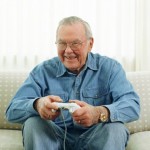 The ability to remain mentally and physically healthy as we age is increasingly important as human longevity creeps ever upwards. A recent study from the University of California, Irvine, suggests that online brain game exercises can help do just that. Indeed, the games seemed to give 70 and 80 year olds the same cognitive ability as people in their 20s and 30s.
The ability to remain mentally and physically healthy as we age is increasingly important as human longevity creeps ever upwards. A recent study from the University of California, Irvine, suggests that online brain game exercises can help do just that. Indeed, the games seemed to give 70 and 80 year olds the same cognitive ability as people in their 20s and 30s.
“The brain is not a muscle, but like our bodies, if we work out and train it, we can improve our mental performance,” the researchers explain. “We discovered that people in the upper age ranges who completed specific training tasks were able to beef up their brain’s ability to switch between tasks in the game at a level similar to untrained 20- and 30-year-olds.”
The cost of multitasking
The researchers highlight the significant cognitive cost of multitasking, as it forces our focus to be split across a number of activities. These costs can become worse due to the natural aging process and the modern media landscape that scatters our attention in an increasing variety of ways. They believe these costs can be mitigated with the right approach however.
The research was conducted in partnership with online brain training company Lumosity, and in particular their task-switching game ‘Ebb and Flow’. The game is designed to challenge the brain’s ability to shift between the distinct cognitive processes involved in interpreting shapes and movement.
Data was collected on millions of players between 2012 and 2017, with a random sample of around 1,000 of these players used to gauge the performance of average players versus those aged between 71 and 80. The data revealed that the older players were able to match or exceed much younger players if they practiced enough (although an accusation of these games is that they simply train you to get better at these specific games rather than unrelated tasks). Nonetheless, it’s a finding that the researchers believe offers a clue to help people age healthily.
“Medical advances and improved lifestyles are allowing us to live longer,” they conclude. “It’s important to factor brain health into that equation. We show that with consistent upkeep, cognitive youth can be retained well into our golden years.”